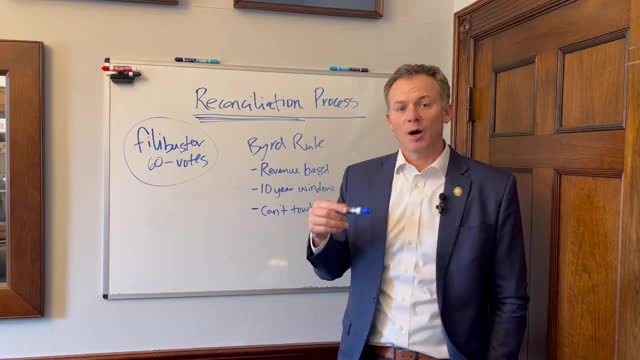Moore explains reconciliation process, urges extensions for expiring tax provisions
Get AI-powered insights, summaries, and transcripts
Subscribe
Summary
In a recorded message to constituents, Congressman Blake Moore outlined how the Senate’s Byrd Rule limits reconciliation and said the Ways and Means Committee will work in the coming quarter to extend tax provisions that expire at year’s end.
Congressman Blake Moore, representing Utah’s 1st District, used a recorded message to constituents to explain how the congressional reconciliation process works and to say he and colleagues will focus on extending expiring tax provisions in the coming months.
Moore said reconciliation is a parliamentary tool that lets Congress pass certain budget-related measures without meeting the Senate’s 60-vote threshold. "Reconciliation in its most simple term basically means you don't have to go through the filibuster. You can pass these bills on basically a simple majority," Moore said, adding that in practice that requires 51 Senate votes and a simple majority in the House.
The congressman described the process as governed by the Senate’s Byrd Rule and said it applies only to measures that are budgetary in character. "The reconciliation process is, controlled by what's called the Byrd Rule... it has to be revenue based. There's a 10 year window aspect to it. That's why certain provisions are are added in and, you can't touch Social Security," Moore said.
Moore cited recent uses of reconciliation to explain how outcomes differ by party control. He pointed to the Tax Cuts and Jobs Act of 2017 as an example of a Republican-led reconciliation package and said Democrats used reconciliation in 2021 for the American Rescue Plan and the Inflation Reduction Act. He summarized differences in emphasis: "2017... was simply tax reform. It enacted pro growth tax policies..." while he described 2021 measures as more focused on relief spending and targeted tax measures for specific industries.
Moore said many of the provisions enacted in 2017 are set to expire at the end of the year and described work in the House Ways and Means Committee to address those expirations in the first quarter. "All of those provisions that were done in 2017 are going to expire next year, at the end of this year. And that would be a massive tax increase on Americans if we let those things expire. So we're working on finding a way to extend it," he said.
He asked constituents to look for further communications and said his office will continue to post updates and explain developments in plain terms. "We had a lot of great feedback about it, so we actually wanna do more of them... we want to use these opportunities to communicate with you... the reality and not the rhetoric," Moore said.
Context and limits: Moore emphasized procedural limits on reconciliation discussed in his message—namely the Byrd Rule’s revenue requirement, the 10-year budget window, and the prohibition on changing Social Security through reconciliation. He also framed reconciliation as a tool that is available only when a party controls both chambers and the White House or when budgetary provisions meet the Byrd Rule’s tests.
No formal votes or actions were recorded in this message; it was an informational communication from the congressman about legislative process and near-term committee priorities.
